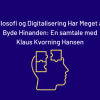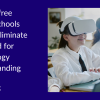"No one is an island, and neither are our skills" - Dansk IT's tripartite model to skills development
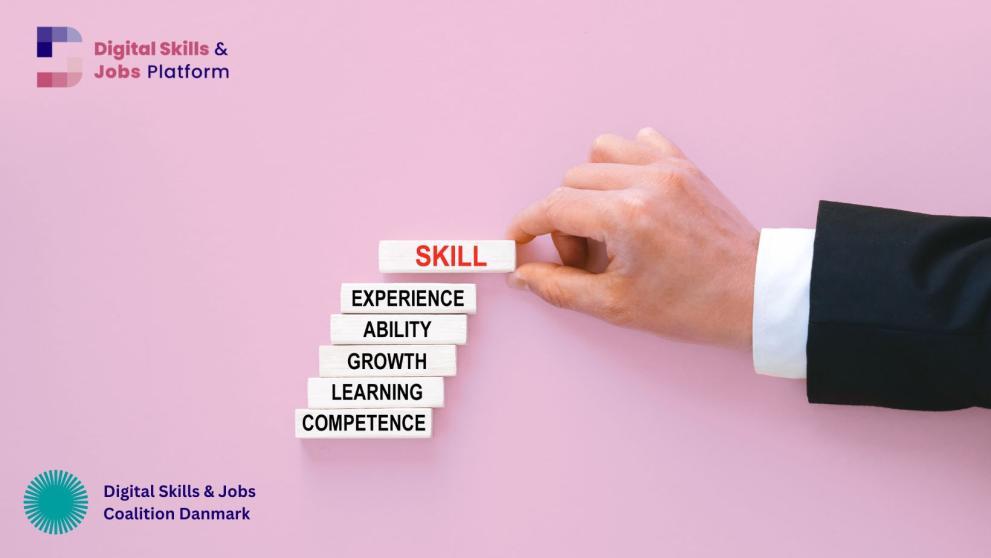
No one is an island and we do not exist in isolation. In every aspect of our lives - private, professional, and so forth, human-to-human interaction is a crucial societal driver. Nowhere does it also say we should have the same skills, do the same things – or even need to be able to do the same things. In all its banality, I strongly believe that the above statement is adequate also in the domain of digital skills.
A diverse and complementary range of digital skills, tailored to different roles and contexts, is essential for building an inclusive and resilient digital society. Despite the constant 'hype' around the ‘latest and greatest’, new things that blink, and are repeatedly predicted to change our lives, our jobs, and our entire society, let's keep our feet on the ground. Even though a lot seems to be developing rapidly these days, especially in the digital domain with generative AI as the most obvious example, there are many things that do not change - like how we learn, how we use our knowledge, and how we retain and maximize the benefits of our learning. And when the overall balance is struck, I am not convinced that we, broadly speaking, will be significantly different now than before.
This op-ed will discuss 'digital skills' which, on the one hand, we all need and will continue to need, and on the other hand, have never been a matter of 'one-size-fits-all'. I fully believe that technology and the skills to handle technology are beneficial and a necessary lever for the development we must and should take the world (and ourselves) in. Only, I am not certain that the technical side of 'skills' is sufficient: Is it really justified to give ‘tech skills’ the almost reverent attention we see around us?
Use it, create with it, reflect on it
At Dansk IT, The Danish IT Society, we work with a three-part division of competencies and skills [1]. Our Committee for Digital Competencies, with whom the Danish coalition in DSJP/C4DD is anchored, has worked with this for years and has also discussed whether 'digital skills' should be something special, something extra, or 'just' part of the package:
- User Competencies: These involve the basic skills needed to use digital technologies, such as operating a PC, browser, or storage media, and evaluating the relevance and trustworthiness of information.
- Creator Competencies: These enable individuals to produce, manipulate, and exchange digital content, such as creating websites, contributing to digital platforms like Wikipedia, and using social media effectively.
- Reflective Competencies: These allow individuals to critically assess the ethical and legal implications of digital technology use, and to make informed decisions about their digital presence and interactions.
Let's look at skills, breaking them down one level at a time. Should we all – citizens, children, young people, adults, and the elderly – be equipped with digital competencies? If we go with the provocatively short answer ‘of course’, then we need to elaborate further. While the use of digital technologies covers a manifold of things, tools, services, apps, etc – they are so embedded within everyday life that few people may end up avoiding them altogether. And even though the technologies we know today will probably change within the next 5 years, the crucial thing is that we try, with willingness and general positivity. I’ll come back to what this requires, beyond mere technical skills a bit later.
Then, should we all be able to create things digitally? Again, creating is many different things, but I maintain that we do not all have the same need to create things digitally ourselves. Photos, party songs, reporting, meeting minutes, coding, or sales pitches … Appealing differently to us, I encourage all to try out whatever makes sense. All around us the research literature deals with questions like ‘to whom are these generative tools valuable, and how?’ Not all of us benefit from digital tools, to say the least.
Thus, should we all relate reflectively to digital technologies? Again, I dare the short, unequivocal answer: 'Naturally!' With everything we are bombarded with in society, professionally and otherwise, it is crucially important that we maintain source criticism and critical thinking. We used to call it digital literacy, as we also like to talk about empowerment. Since we cannot be critical thinkers without having 'knowledge' ourselves, any such empowerment depends on experience from using it. The better informed, educated, and independently reflective thinkers we all become, the further we shall get when having the important, meaningful, and also difficult conversations that are needed (before the corresponding change processes and transformations the world is facing).
Learning and 'upskilling' is never just about technology
As I hinted above, this does not rest on technology alone. In my view, an important driver is 'serendipity', or 'the art of finding something we didn't know we needed'. Maintaining curiosity and being open to things we don't yet understand is central. Trust (in each other, in authorities, in technology) is also essential – not to be confused with naivety (in a Danish context, we have an enormously high level of trust, a trust we should care for also in the future, while remembering and enhancing our critical thinking as well).
Curiosity and trust are linked to other aspects surrounding technology itself. A Danish governmental agency has worked hard on how it expands and strengthens its capabilities within the organization, the skillsets and competencies, that is both individually and organizationally: The competencies (skills) themselves are just one of four 'cornerstones', while the other three are precisely curiosity, well-being, and anchoring. To put it simply: Skills alone won’t make a difference if we don't…
- Make sure people around us are well, feel 'safe' in the organization and with their position and in their jobs.
- Maintain and support curiosity – serendipity now and onwards.
- Ensure that 'anchoring' is solid, that have responsibility in place (to whom and where should we go in case we have the need?) Upskilling takes a village
Let’s take a step back to the ‘island’ metaphor from the headline. A few years ago, there was much talk about ‘T-Shaped Skills’ where each of us should have at least one deep competence area (called the core and being the vertical bar of the T). In addition, all of us also need broader 'generalist' skills (the horizontal bar of the ‘T’), see Figure 1. In contrast, when people stop being curious about the things they don’t know about themselves, the horizontal bar becomes ‘too narrow’ (the lighter colour in Figure 1).
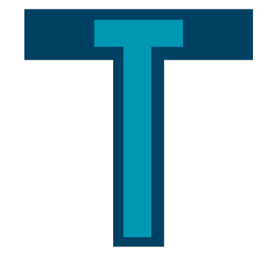
In Life, we all need others, no one exists in isolation. This applies everywhere - be it cyber, AI, cloud, accounting, or any other sector you dive in (i.e. accountants with a flair for tech, tech people with an understanding of accounting). Consequently, our collective ‘grasp’, and ability to deal with things together, will be affected negatively, as illustrated in the ‘missing parts’ of the horizontal bar in Figure 2.
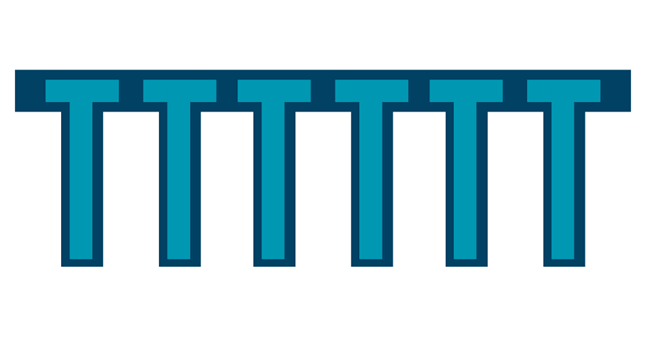
Another way to talk about the same thing is found with (the world-class author, thinker and speaker) Simon Sinek: ‘There’s no such thing as soft skills – those are human skills, and they are nothing but soft’. Again, the much-maligned curiosity towards the things we don’t know, is crucial: We need broader generalist skills, better conversations, as is indicated in Figure 3.
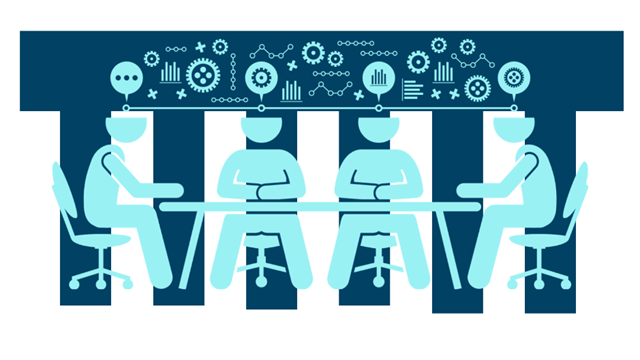
Let’s take a swing at the AI craze…
A blind or one-eyed belief in technology does not necessarily lead us forward. Everywhere we are met by the 'generative AI' craze, hype (or even ‘fever’). This hype suggests everything will be changed for the better, all tasks be streamlined and improved, and the time we spend on them reduced. But is it really so? When it comes to it, who can actually claim to experience saving that time; and how is it then used instead?
There are many pitfalls, hidden costs, and things we have not yet figured out in the happy narratives of the Wonders of GenAI. As a matter of fact, research literature has dealt with the benefits as well as the costs of automation for decades. In recent years, ‘business' literature has also caught up. I shall highlight a few key points taken from some of that very briefly (and invite all to read on for themselves):
- Polarization of tasks: The easy becomes easier, the difficult more difficult. This has been called the ‘ironies of automation’ for long; now also ironies of generative AI) [2,3].
- Disruptions and interruptions in task-solving costs too – leading to possible productivity losses [2,3,4].
- Offloading our work to AI tools causes new cognitive requirements which may lead to exhaustion, as well as the creation of new work and tasks to not only ourselves, but also others [2,4,5]
- The time we 'save' on AI tools so far seems to be 'wasted' somehow, and many of the promised benefits are so far not seen in the labour market [4,5].
Thus, I shall end where I started: I believe that technology is necessary for us to ensure the pathway towards the future we deserve (and the world with us). I also believe that curiosity, courage, openness, and practical work (experimentation and qualified considerate trials) is the way to go. But foremost, I believe we have to do it together – learning takes a village.
About the author
Hans Ravnkjær Larsen is Head of Events and Associations at Dansk IT, where he combines empathy, honesty and curiosity with an innovative approach to creating meaningful events and strengthening the community among IT professionals. With a passion for bringing people together and facilitating knowledge sharing, he plays a central role in promoting digital development and networking in Denmark.
About DANSK IT
Dansk IT is a key player for IT professionals in Denmark and works to strengthen the role of technology in digital development, business and society. As an independent interest organisation, Dansk IT gathers professionals who want to promote digitalisation, IT security and responsible use of technology.
Dansk IT was founded in 1958 under the name Databehandlingsforeningen and is one of the world's oldest associations for IT professionals. From the beginning, the association has played a central role in competence development and actively contributed to the public debate on information technology.
Over the years, Dansk IT has developed into a professional interest organization that offers a wide range of courses, conferences and networking groups for IT users and professionals. Dansk IT's mission is to promote and strengthen the use of IT where it creates value for society and the individual. The association works purposefully to gather, strengthen and develop IT skills on an independent basis and to represent the members' IT interests in Denmark.


